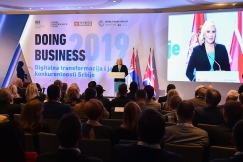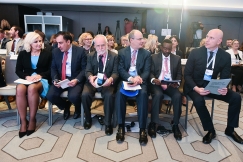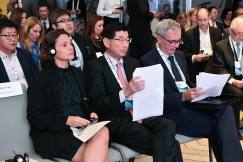On the World Bank Doing Business report for 2019, Serbia took the 48th position among 190 countries, which represents a fall of five places compared to last year, announced at the 3rd annual conference “Doing business 2019 – Digital Transformation and Strengthening of Serbia’s Competitiveness”.
At the 3rd annual conference organised by NALED, the World Bank and the British Embassy, it was estimated that Serbia was active in reforms in some categories, but these reforms were not done on time to be included in the list and their effects are expected in the next reports. However, there are more areas in which the reforms have failed to allow the more agile countries to overtake us.
“During 2017 and 2018, we initiated systemic reforms in key areas such as a cadastre whose full effect can be expected only in the following years. We have been working on the construction permits reform for five years, and on the way to the 11th place in the world, we surpassed more than 170 countries,” emphasized prof. Dr Zorana Mihajlović, Deputy Prime Minister of Serbia and Minister of Civil Engineering, Transport and Infrastructure, who is the President of the Joint Government Group to improve Serbia’s position on the Doing Business List.
Among the important but “delayed” reforms is the abolition of the seal for the economy and the simplification of the procedure for obtaining electricity connections, new solutions for the protection of minority shareholders, as well as the introduction of an electronic registration of property tax and the transfer of absolute rights.
“Economy expects the Government of Serbia to finalize parafiscal charges such as environmental protection or fiscal charges that still bind the economy to 12 annual payments, improve the enforcement process and security, shorten the bankruptcy procedure, ensure that public companies issue more efficient location information conditions for construction and successfully completed the initiated cadastre reform,” said Slavko Carić, representative of the NALED Property and Urban Property Alliance.
The conference assessed that the Doing Business list shows that digitization is the key to creating better business conditions, as it reduces the steps to be taken, as well as the costs of the administration, which the World Bank and investors especially value. The largest support for the development of e-government in Serbia, worth 5.2 million euros, was given by the United Kingdom Government’s Good Governance Fund.
“Doing a business report should be used to set priorities. Jobs in Serbia are easy to open, but they are difficult to close. Access to finance is particularly difficult in the early stages of development. It is necessary to speed up proceedings before the court, as well as to resolve bankruptcy proceedings where the Good Governance Fund also supports reforms. Together with NALED, we worked on cancelling stamps, electronic archiving and other prerequisites for the full implementation of e-business in practice, while the next major reform, which is expected from the process of registering property in the Real Estate Cadastre. That is why the British Government, through the Good Governance Fund, provided support for the implementation of the new law and the establishment of a functional e-Counter,” said British Ambassador Denis Keefe.
The head of the World Bank Office in Serbia, Stephen Ndegwa, explained that the Doing Business List methodology measures the distance of each country from the best regulatory practices in the ten categories that track what governments can do to measure performance in the implementation of reforms. More than 60 of the world countries have formed individual bodies that use the DB list as a roadmap for the implementation of regulatory improvements, including Serbia, which since 2014 has a Joint Group of the Government of Serbia, involving line ministers, businesspeople and experts. The World Bank list is an excellent instrument for mutual comparisons and sharing practices and solutions from the most prosperous countries.
That is why the special guest of the 3rd annual conference was former Georgia Prime Minister Nika Gilauri, who shared the reform experience that made his country from 2004 to 2014 reach from the 112th to the 8th position on the Doing Business List. Georgia is the most prosperous country in the World Bank’s ranking with 47 implemented reforms, and was particularly effective in the reform of the cadastre (the world’s first), issuing building permits, protecting minority shareholders and starting a business (the other).
Thanks to continuous reforms, among which the reform of the judiciary, tax reform, the fight against corruption and the simplification of administrative procedures through the introduction of one-stop shop procedures are particularly emphasized, Georgia set a new record as it reached the sixth position on the original list for 2019 and, together with Macedonia, is the eastern European country in the Top 10.
Regarding the countries of the region, on the new Doing Business list, only Macedonia (10) and Slovenia (40) are the only successful ones from Serbia, while behind us are Montenegro (50), Romania (52), Hungary (53), Croatia 58), Bulgaria (59), Albania (63), Bosnia and Herzegovina (89).





